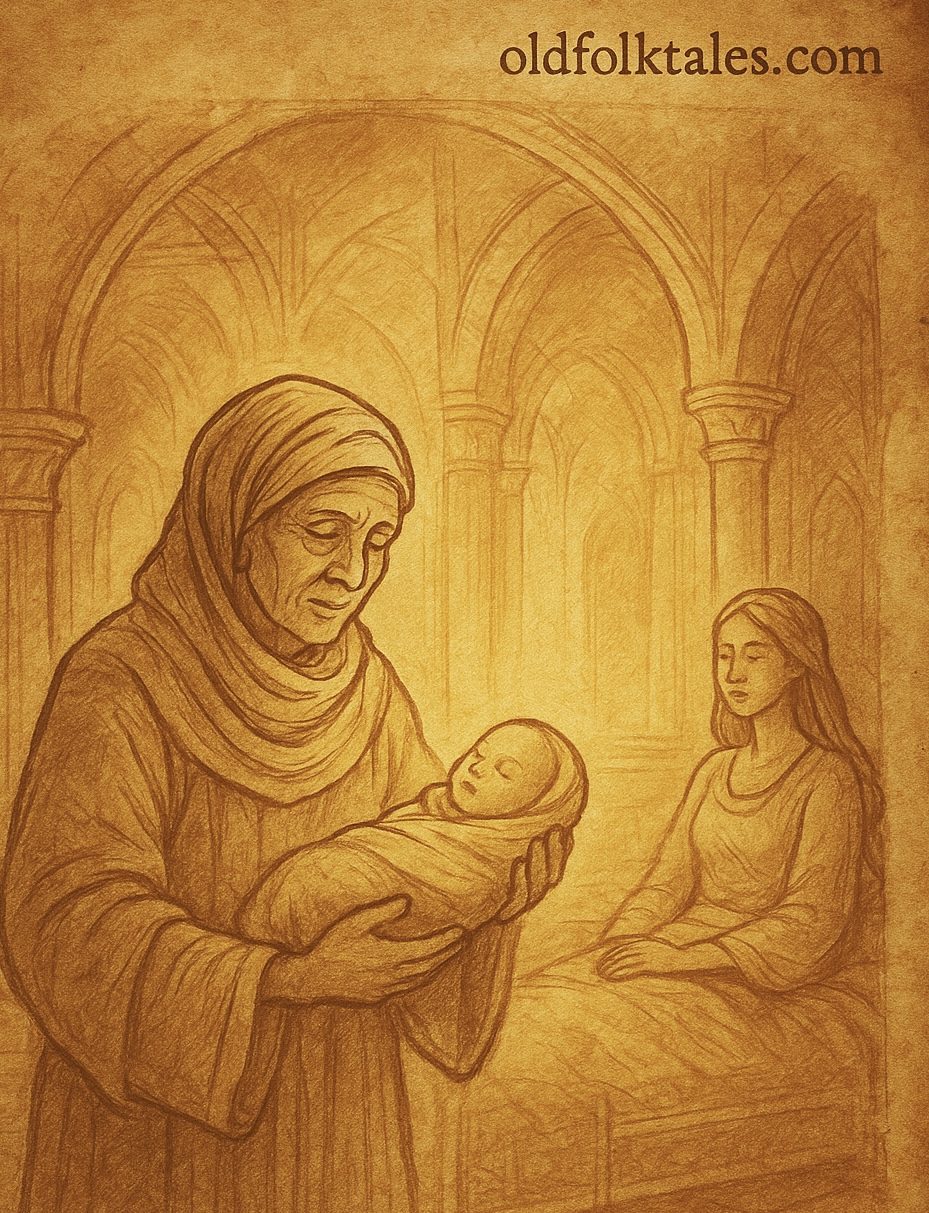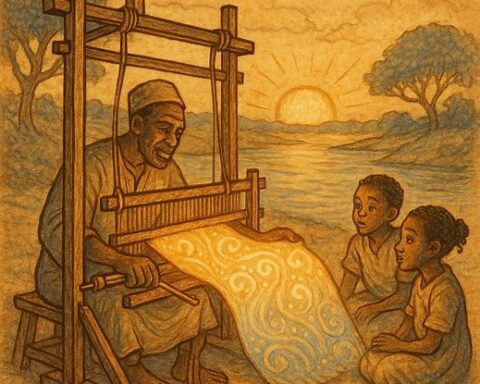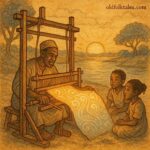Everyone in Dakar knew old Fatou. She was the midwife of the town, the one whose hands had welcomed countless babies into the world. Women trusted her skill, and families from as far as Bir would call upon her when childbirth came. Her hut stood just outside the old black village, a place that in time gave way to European style houses and fine streets. Yet despite all the change around her, Fatou remained known for her compassion, her steady hands, and her courage in moments when mothers’ cries filled the night.
One evening, after a long day of work, Fatou lay asleep. The silence of the night was broken by a firm knock at her door. At once she thought someone needed her for her usual work. She rose quickly, tied her wrapper, and went to open the door. But instead of a worried father or mother, she stood face to face with a towering jinn.
Fear filled her heart. She tried to step back, but the jinn stretched out his hand, grasped hers, and placed her before him with a gesture that told her to walk. Trembling, Fatou obeyed. Though she was terrified, she noticed that the jinn did not hurt her. He slowed his pace so she could keep up, and his eyes held no anger. Still, she dared not speak, for she did not know what awaited her.
They walked for what felt like hours. The night air was heavy and still, and the shadows stretched long around them. At last they came to a castle so grand that Fatou gasped. Its walls gleamed in the moonlight, finer even than the Governor’s palace in the city. Wide courtyards opened before them, lined with arches. They passed through vast empty rooms until they reached a chamber richly adorned.
Inside, Fatou saw a young jinn woman lying upon a bed of ebony inlaid with silver. Around her stood jinn men and women dressed in garments more splendid than anything Fatou had ever imagined. Silks glistened, jewels sparkled, and the air seemed alive with power. The young woman cried out in pain. Fatou understood at once why she had been brought here.
Summoning her courage, she stepped forward. The jinn surrounding the bed parted, allowing her space. She washed her hands, steadied her breath, and began her work. The cries of the young woman grew stronger, but Fatou guided her with the same calm strength she had shown countless mothers before. In time, a healthy child was born. Fatou received the newborn gently, washed it with care, and laid it back in its mother’s arms. Relief spread across the mother’s face, and the room filled with quiet joy.
Yet scarcely had Fatou completed her task when the world around her dissolved. The shining palace, the richly clothed figures, the grand courtyards, all faded like mist at dawn. Fatou blinked and found herself standing near the first huts of Dakar, just beside the hospital. In her hands she held nothing but her own cloth.
Bewildered, she hurried home. When she entered her hut, her eyes widened in wonder. Upon her table lay a heap of gold coins that shimmered in the lamplight. Beside them rested a heavy silver bracelet, finer than any work of the jewelers she had ever known. This was her payment.
The bracelet became proof of her tale. Whenever she told others of that strange night, she showed them the piece of silver. Beautifully made, untarnished, and shining as if new, it bore designs unlike anything crafted by human hands. Many Europeans offered her money for it, eager to possess such a treasure, but Fatou refused them all. To her, the bracelet was more than silver. It was a reminder of the night she crossed into the hidden world, where her gift as a midwife was needed even by the jinn.
Moral Lesson of The Midwife of Dakar
This Wolof folktale teaches that courage and integrity carry us through even the most fearful trials. Fatou could have refused to follow the jinn, but she trusted her duty as a midwife. By remaining calm and faithful to her calling, she earned honor, treasure, and the respect of two worlds. The story reminds us that when we serve others with skill and courage, our work speaks louder than fear.
Knowledge Check: The Midwife of Dakar
Who was Fatou in the folktale?
Fatou was a midwife in Dakar known for helping women during childbirth.What happened when Fatou opened her door at night?
She found a great jinn who led her away to a distant place.Why had the jinn summoned Fatou?
She was brought to deliver the baby of a young jinn woman.What did Fatou see inside the castle?
She saw a richly adorned chamber with a young jinn woman on a bed of ebony and silver, surrounded by splendidly dressed jinn.What reward did Fatou receive after delivering the baby?
She found a heap of gold coins and a heavy silver bracelet on her table.Why did Fatou refuse to sell the bracelet?
She valued it as proof of her encounter with the jinn and treasured it beyond money.
Source: Wolof folktale, Senegal






